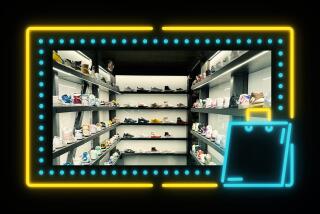Getting Off the Carousel of Bad Marketing
- Share via
Inspired by Nancy Lundin’s passion for restoring carousel horses, the Lundin family opened an upscale gift and housewares shop last November with a carousel theme.
Although the Carousel of Gifts concept was clever, the shop faced obstacles, including a somewhat risky location in a Valencia strip mall. And, while it offered elegant china, crystal and pewter merchandise, the goods were not always artfully displayed.
“They had these wonderful Limoges china boxes in delicatessen cases,” recalled Janet Plant, a principal in Identity Resources, a strategic marketing firm hired by the Lundins to revamp the store. “I let them know they were not selling corned beef sandwiches; they were selling Limoges.”
To spruce up the shop, Identity Resources brought in a graphic designer to create a colorful carousel logo and paint carousel horses on the shop walls. The logo now appears on all the shop’s printed material as well as on canvas tote bags and T-shirts.
After establishing the logo and store decor, Plant suggested new products for the shop, including a line of gourmet coffees. She even shopped for new merchandise with Nancy Lundin and her daughter, store manager Wendy McGlouthern. “We took them from drab to dramatic,” Plant said.
Plant also recommended that the Carousel of Gifts attract customers by publicizing the hours that Nancy Lundin works on the carousel horses in the loft studio above the shop.
“There has been a definite increase in our sales, despite the summer doldrums,” McGlouthern said, adding that the gourmet coffee line suggested by Plant has been a big success.
Jon Lundin, a real estate developer who established the gift store for his wife and daughter, said he hired Plant and her husband and partner, Dick Rose, earlier this year because the shop was struggling.
“We wanted someone to get us focused,” said Jon Lundin, who is president of British & Continental Development Inc.
He said the most important service that Plant and Rose provided was putting on the “customer’s hat” and seeing the store from that perspective.
In addition to looking at the store through the customer’s eyes, they conducted a marketing survey to determine exactly what kind of merchandise people in the neighborhood would buy.
“We started out focusing on high-end crystal and pewter but found out that a lot of people can’t afford it,” Jon Lundin said. When the shop added more affordable gift and household items, he said, sales increased.
Plant and Rose combine her retail marketing expertise with his background in graphic design and public relations. “No matter how small your business is, you need an identity,” Plant said. “We help companies define their image. We ask, where are you going and where do you want to be?”
Plant, who formerly worked for Wickes Corp., said it is wrong to assume that a customer understands your products and services the way you do.
She said many small business owners are surprised to learn that customers are misinformed because the company’s name does not properly describe its products or services. A company also creates confusion by not having a consistent look to all its printed material.
The first thing Identity Resources does for a new client is perform a marketing audit. They review all the written materials distributed by the company. They interview employees, vendors and customers to find out what people really think about the business. Only then do they sit down with the owners and come up with a marketing strategy.
“Most small business owners do not have a long-term plan. They deal with crisis marketing,” Plant said.
Rose, who formerly ran a company that provided public relations and marketing services to advertising agencies, said even a bad image is better than no image. The couple charges clients depending on the project, with most jobs ranging between $5,000 and $50,000.
Even if you can’t afford to hire marketing consultants, Plant and Rose said, small business owners can benefit by conducting their own quick, mini-marketing audit.
“The easiest thing to do is hand a stranger your business card and ask him what business he thinks you are in,” said Rose. “Then, ask him what level of pricing does he think you have for your products--upscale or mid-level.”
The answers may surprise you, Rose said. And if your business card does not reflect the kind of business you are in, change it.
After checking on the effectiveness of your business card, Plant and Rose suggest creating a short, anonymous questionnaire about your business image. Ask employees, vendors, suppliers and customers to be honest about what they think. Rose said this information can be enormously helpful and costs virtually nothing to obtain.
POLISHING UP AN IMAGE
If you are unsure about your company’s image, ask yourself these questions:
How do you want your business to be perceived?
How do you think your business is actually perceived?
Does your company name reflect what you sell?
Does your business card, letterhead and other printed material have a consistent, unified look?
Does the printed material clearly communicate what service you provide or what product you sell?
Are you using the same message on every written piece of information?
If you answered no to the last four questions, its time to think about polishing up your image or looking for a new identity.
More to Read
Sign up for The Wild
We’ll help you find the best places to hike, bike and run, as well as the perfect silent spots for meditation and yoga.
You may occasionally receive promotional content from the Los Angeles Times.






